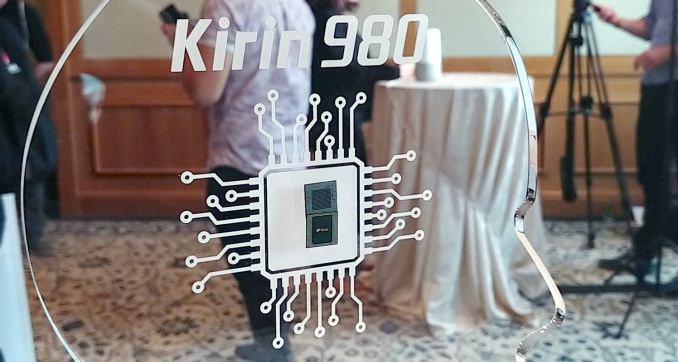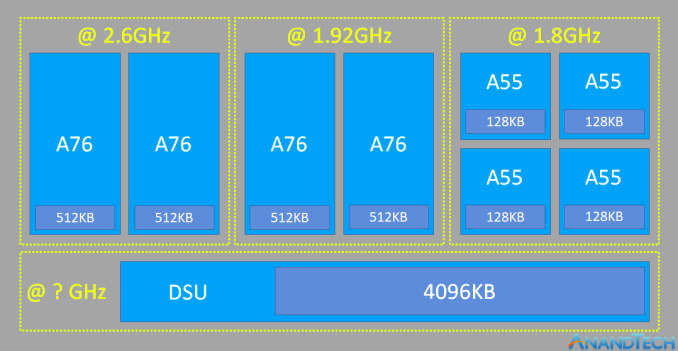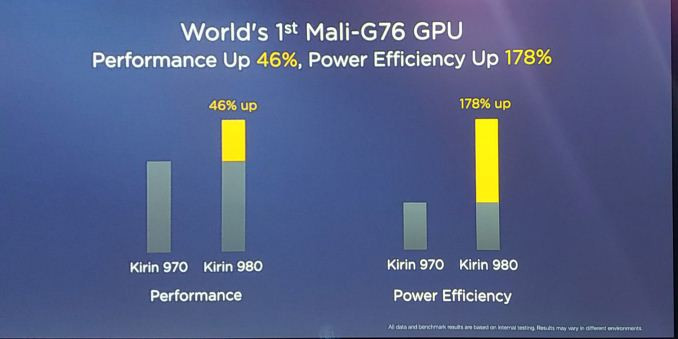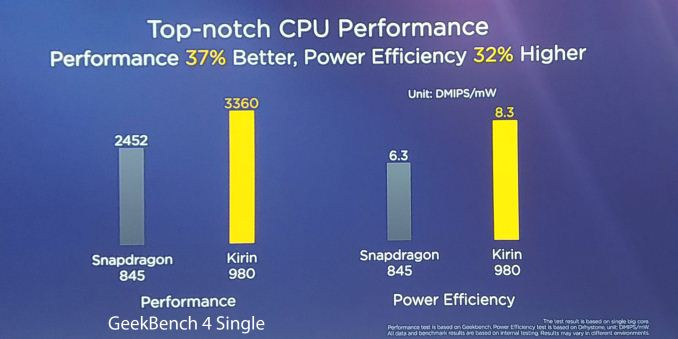Arm announced Cortex A76 CPU core and Mali-G76 GPU in June of this year, and in the past, we normally had to wait about a year between the announcement and the actual launch of SoC with the new IP core.
But courtesy of HiSilicon (Huawei), we already know of one Cortex A76 processor with Kirin 980 processor featuring three clusters with two high performance Cortex A76 cores, two Cortex A76 cores clocked at a low frequency, and four Cortex A55 efficiency core. The company also added the new Mali-G76 GPU for good measure.
 Kirin 980 specifications and key features:
Kirin 980 specifications and key features:
- CPU (DynamIQ clusters)
- 2x Cortex A76 cores @ up to 2.60 GHz with 512KB L2 cache
- 2x Cortex A76 cores @ up to 1.92 GHz with 512KB L2 cache
- 4x Cortex A55 cores @ 1.80 GHz with 128KB L2 cache
- 4MB shared L3 cache
- GPU – ARM Mali-G76MP10 @ 720 MHz
- NPU – Dual NPU (Neural Processing Unit) with twice the performance compared to Kirin 970
- Memory I/F – 4x 16-bit LPDDR4X @ 2133MHz 34.1GB/s
- Storage I/F – UFS 2.1
- Camera I/F – Dual ISP with10-bit pipeline
- VPU – 4K60 video decoding, 4K30 video encoding
- Modem – LTE Cat 21/18 modem with 1.4 Gbps download, 200 Mbps upload
- i8 Sensor Hub to handle sensors
- Processor – TSMC 7nm
 As a reminder Cortex A76 is supposed to provide laptop-class performance with 35 percent more performance compared to Cortex A73/A75, and Kirin 980 should deliver 75% higher CPU performance, and 58% better efficiency compared to Kirin 970.
As a reminder Cortex A76 is supposed to provide laptop-class performance with 35 percent more performance compared to Cortex A73/A75, and Kirin 980 should deliver 75% higher CPU performance, and 58% better efficiency compared to Kirin 970.
GPU performance, and even more power efficiency is also much better with the Mali-G76MP10 GPU in Kirin 980 compared to the Mali-G72MP12 in Kirin 970.
HiSilicon also provided some charts showing much higher single core performance and power efficiency over a Snapdragon 845 processor in GeekBench 4.
When it comes to AI workloads the difference is even more striking with claims of 134% better performance, 94% better efficiency with Resnet 34 & Inception V3.
The company also unveiled Hi1103 WiFi chipset supporting 802.11ac up to 1732Mbps, which HiSilicon claims is the world’s fastest smartphone WiFi speed.
Huawei Mate 20 and Mate 20 Pro smartphones should be the first devices to launch with Kirin 980 processor, and we won’t have to wait too long to find out about the official launch is planned for October 16th. We should already expect a Hikey 980 development board a bit later, maybe in Q1/Q2 2019.
Via AnandTech

Jean-Luc started CNX Software in 2010 as a part-time endeavor, before quitting his job as a software engineering manager, and starting to write daily news, and reviews full time later in 2011.
Support CNX Software! Donate via cryptocurrencies, become a Patron on Patreon, or purchase goods on Amazon or Aliexpress






